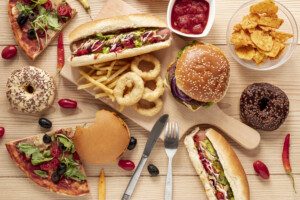Some call the diet industry toxic, but what about the junk food industry that uses slick advertising to brainwash us and rakes in a sh*t-ton more money?
There’s diet culture. And then there’s junk food culture. Which one would win in a fight?
The junk food industry would clean the clock of the diet industry within seconds of the first round.
The diet industry is not a culture, though. Neither is the junk food industry. Rather, they are industries for profit.
The diet/weight loss industry brings in about $78 billion a year in the U.S.
This figure, which fluctuates depending on the source and the year cited, is often used by influencers as some kind of proof or evidence that the weight loss and diet industries are poisonous and cult-like.
What they fail to include in their social media messages is that the fast food industry rakes in a mind-blowing $273 billion a year in America.
The ice cream industry? $11 billion. The chocolate industry? $100 billion worldwide.
Based on these figures, it’s easy to see that the junk food [heavily processed food] industry, taken altogether, is a monster, and the diet industry is just a little peanut.
But according to the thinking that goes on in many Instagram and TikTok posts, these content creators should also view the processed-food industry as exceptionally toxic and cult-like.
Does the diet industry dismantle self-worth?

Depositphotos.com
This is just me, but I’ve never felt bad about myself whenever I saw a Jenny Craig commercial or Marie Osmond tossing away a 10 lb. dumbbell that symbolizes 10 pounds of human fat.
I never felt a plummet in self-worth just because I kept seeing that TV commercial that goes, “A shake for breakfast, another for lunch and then a sensible dinner.”
The so-called anti-diet crusaders claim that diet ads tell consumers that they can’t be happy unless they lose weight.
They point out that weight loss ads send the message that overweight people are lazy, can’t be loved, can’t be happy or successful, and are failures.
I’ve never seen a weight loss ad, such as for Nutrisystem or Noom, deliver these messages.
None have slogans to the effect of, “If you don’t lose weight you’re a failure,” or, “You’ll never get married unless you’re thin.”
If any industry blatantly advertises an association between self-worth, self-confidence and happiness with physical appearance, it’s the dental and hair restoration industries.
Watch any of their commercials or infomercials. The messages are strong and abundant: Self-esteem, self-worth and success in life are intimately tied to how white and straight your teeth are and how much hair on your head you have.
Ironically, we don’t hear a barrage of complaints from TikTok and Instagram creators about these industries, which certainly bring in billions of $$$ every year, e.g., a hair transplant costs $3,000 to $15,000.
Examples of the Junk Food Industry’s Manipulation of Our Emotions

The ads are notorious for sending the cryptic message that we can’t be happy unless we eat their sugary, processed, heart-damaging, high blood pressure-causing product!
The junk food industry (which includes processed foods that are marketed as good for you — and I didn’t even include boxed processed dinners in the earnings totals) wants you to feel helpless without their sugar-laden, sodium-laden, trans-fat-laden products!
“Get the sensation” — Slogan for the York Peppermint Patty TV commercials using very attractive people. These ads have sexual undertones.
“You’re not you when you’re hungry” — Slogan for Snickers, telling us that when we’re grumpy, cranky or irritable due to hunger, a very sugary candy bar is the cure.
“You deserve a break today, so get up and get away, to McDonald’s” — Jingle of many years ago for the fast-food giant.
Speaking of Mickey D’s, let’s not forget the “Happy” Meal! Need I say more?
Werther’s candies commercials involve close-up shots of glamorous women seductively placing a piece of candy into their mouths. Want to feel sexy? Have some Werther’s caramels.
Marie Callender’s pot pies — TV commercials play on the emotions of missing our grandma’s cooking, which we associate with her love.
These extremely high sodium pot pies contain toxic trans fats and over 100 ingredients per pie (many sound like chemicals made in a lab), yet the company advertises that the pies are like Grandma used to make. What a blatant lie. Grandma probably used only 10 natural ingredients, tops.
Hostess Cupcakes — They once had a commercial campaign calling these chemi-cakes “wholesome” because they contained milk. Hostess marketed the word “wholesome” to mean healthy.
I grew up on Hostess cupcakes – they sure tasted good! But … knowing what I know now, I won’t dare touch one.
Junk food manufacturers feed us lies all the time, which include brainwashing women into believing that their product is healthful for their children.
Why isn’t this brainwashing called out by the anti-diet-industry camp?
Another example is the Sunny-D commercials that target mothers of teenagers.
This stuff is liquid candy. Why not give your teens all-natural orange juice fresh squeezed at home?
Well, the Sunny-D ads have convinced gullible moms that their sugar-added, artificially-made product is better than nature.
What about all the years those Frosted Flakes commercials spent tricking moms into thinking that their sugary, highly processed flakes would give their kids an edge in athletic activities? What a lie if I ever saw one.
Some Fair Questions by Inquiring, Intelligent Minds
If a young woman develops a body image disorder or obsession with counting calories, tracking macronutrients, recording her weight, measuring her waist and pining for a body just like her favorite recording artist — shall we blame Nutrisystem’s TV ads and Victoria’s Secret lingerie shows, OR … shall we probe for possible dysfunction that this individual may have endured during childhood right inside her house?
When teens and young women have a savagely toxic relationship with food, is this more likely from weight loss TV commercials and thin models in magazines, OR … could it more likely be from having watched 2,000 TV commercials about how some kind of candy or fast-food product can soothe our emotions, calm us down, make us feel sexy and lift our spirits?
Now, all of this isn’t to deny the reality that there do, indeed, exist companies that sell weight loss products that come with a lot of fraudulent marketing.
The classic example is some “fat-burning” pill for which the ads claim will melt 10 pounds off your body in seven days.
One ad even included a silly warning — obviously meant to convince naive people that the pill was remarkably effective — That the product may cause too much weight loss, and if this happens, to immediately cease taking the pill!
It is our responsibility as adults in an industrialized society to recognize such obviously false claims and to just laugh at these ads – which, during the days of full-size newspapers, would take up an entire page of the newspaper.
Just because a small number of weight loss companies makes outrageous claims and uses fake testimonials (e.g., “Jack S.,” “Pat M.” and “Michelle B.,”) doesn’t mean that collectively speaking, the diet/weight loss industry is rancid — or at least, any more deranged than any other for-profit mega-industry.
There are scamsters in ALL industries (e.g., mortgage, real estate, auto repair, cosmetic surgery, roofing, home construction, apartment rentals).
The toxic junk food industry has contributed to the chronic diseases of tens of millions of Americans.
In fact, so toxic is SAD — the Standard American Diet — that a diet of heavily processed foods can cause chronic disease in even thin people.
The industry’s drive-thru windows, relentless TV commercials and constant advertising of bargains have further fueled our lust for foods that ravage the human body. Can you get more toxic than that?
Western Diet and Chronic Illness

Freepik.com
“The Western diet is quantitatively and qualitatively a poor diet,” begins Dr. David Beatty, MD, a retired general practitioner with 30+ years of experience and an instructor of general medicine for 20 years.
“The portion sizes are too large, and the nature of the food we eat isn’t ideal from a health perspective.
“Our diet has too many calories, too much sugar, too much sodium (salt) and too much saturated fat. It’s relatively low in fruit and vegetables.
“In contrast, the healthy Mediterranean diet is high in whole grains, salad, fruit, vegetables, seafood, nuts, beans and olive oil.
“In the USA in 2016, 36.2% of the adult population were obese and 70.2% were overweight.
“The adult population is about 210 million, so about 76 million are obese.
“This is almost all because of the Western diet and a sedentary lifestyle.
“Obesity increases the chance of developing high blood pressure, heart disease, stroke and other vascular disease.
“Blood clots are more common. Numerous cancers are more prevalent.
“Diabetes is more likely to occur. This further bumps up the risk of cardiovascular disease, visual problems, kidney failure and neuropathy.
“Arthritis of the knees and hips is more likely, aggravating mobility problems.
“Mental health can suffer with an increased incidence of depression.
“The Western diet, and the consequences of it, pose a huge health and economic burden to the USA.”
How can anyone declare that the diet industry is toxic to the human body?
The following industries are behind bodily destruction: soda, cake and muffin mix, candy, ice cream, fast-food, processed dinners, luncheon meat … and when you add up the yearly profits, they make the profit of the diet industry literally a drop in a bucket.
 Dr. Beatty has worked in primary medicine, surgery, accident and emergency, OBGYN, pediatrics and chronic disease management. He is the Doctor of Medicine for Strong Home Gym.
Dr. Beatty has worked in primary medicine, surgery, accident and emergency, OBGYN, pediatrics and chronic disease management. He is the Doctor of Medicine for Strong Home Gym.
 Lorra Garrick has been covering medical, fitness and cybersecurity topics for many years, having written thousands of articles for print magazines and websites, including as a ghostwriter. She’s also a former ACE-certified personal trainer.
Lorra Garrick has been covering medical, fitness and cybersecurity topics for many years, having written thousands of articles for print magazines and websites, including as a ghostwriter. She’s also a former ACE-certified personal trainer.
.
Top image: Shutterstock/Africa Studio



























